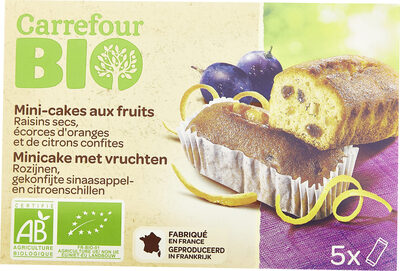Mini-cakes aux fruits - Carrefour - 175 g
This product page is not complete. You can help to complete it by editing it and adding more data from the photos we have, or by taking more photos using the app for Android or iPhone/iPad. Thank you!
×
Some of the data for this product has been provided directly by the manufacturer Carrefour.
Barcode: 3560070478750 (EAN / EAN-13)
Common name: Petits cakes aux fruits issus de l'agriculture biologique.
Quantity: 175 g
Packaging: Cardboard, fr:Sachets plastiques individuels
Brands: Carrefour, Carrefour BIO
Categories: Snacks, Desserts, Sweet snacks, Biscuits and cakes, Cakes, Fruit cakes
Labels, certifications, awards:
Organic, EU Organic, Non-EU Agriculture, EU Agriculture, EU/non-EU Agriculture, FR-BIO-01, Made in France, AB Agriculture Biologique

Traceability code: EMB 59599D - Tourcoing (Nord, France)
Stores: Carrefour
Countries where sold: France
Matching with your preferences
Environment
Carbon footprint
Packaging
Transportation
Labels
Other information
Conservation conditions: À conserver dans un endroit sec et tempéré. Après ouverture, à conserver dans une boîte hermétique et à consommer dans les 2 jours. Meilleur avant / À consommer de préférence avant le : voir sur le côté de la boîte.
Customer service: Interdis - TSA 91431 - 91343 MASSY Cedex - France
Report a problem
Data sources
Product added on by miles67off
Last edit of product page on by foodless.
Product page also edited by ecoscore-impact-estimator, edb, kiliweb, manu1400, moon-rabbit, morganesh, openfoodfacts-contributors, org-carrefour, packbot, roboto-app, tacite-mass-editor, yuka.sY2b0xO6T85zoF3NwEKvlnwYfdyDnW3ZZzPvpxWyxvSAM8D0Z-xRuoikHKs.












